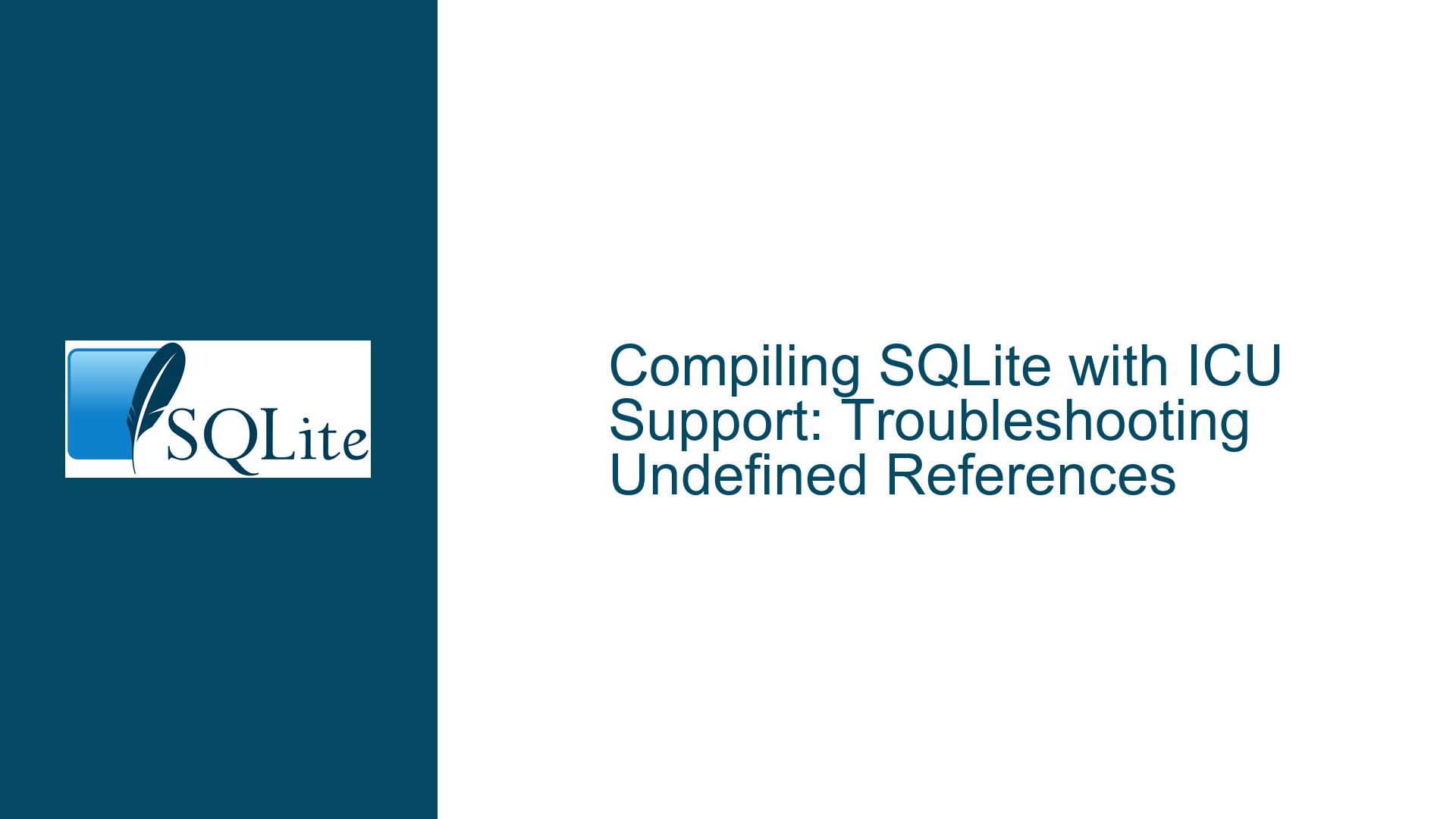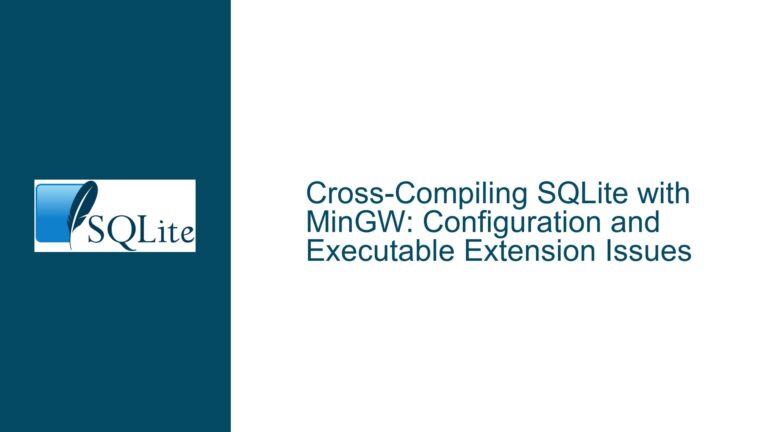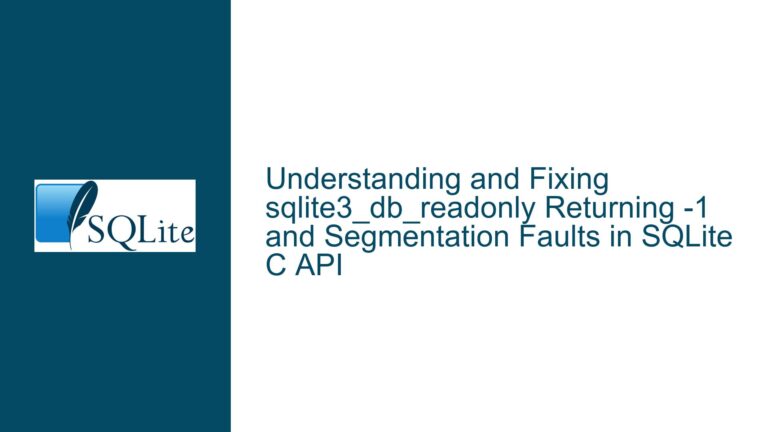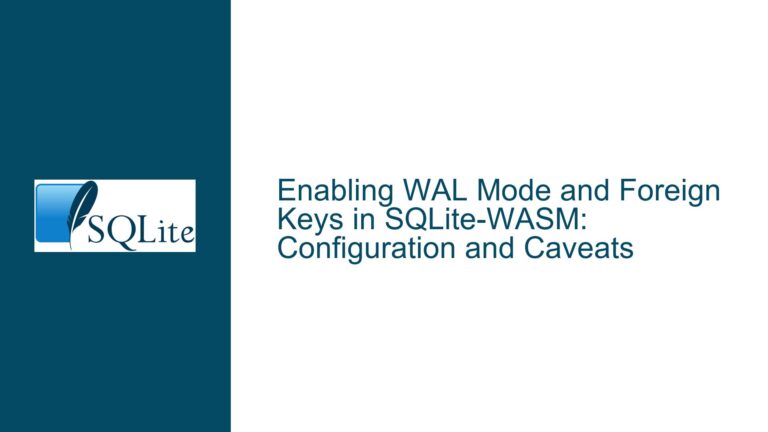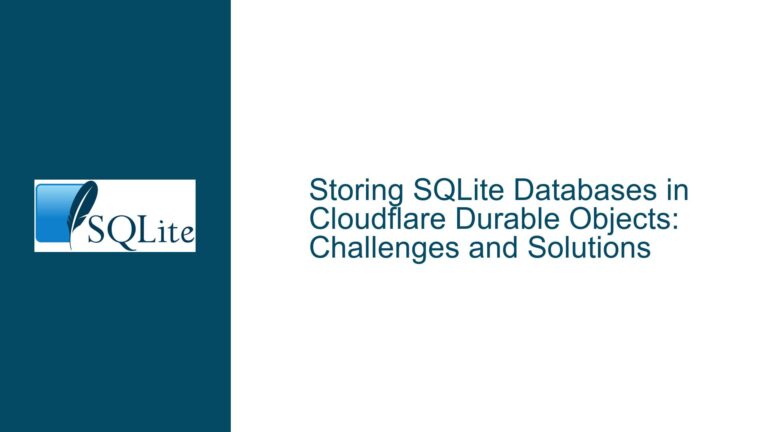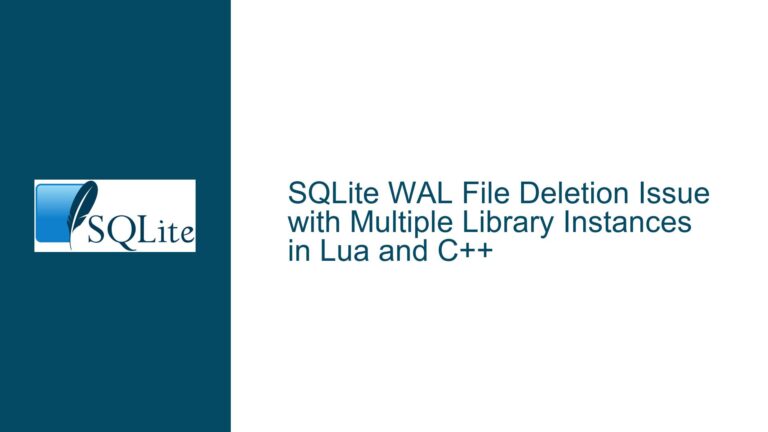Compiling SQLite with ICU Support: Troubleshooting Undefined References
Issue Overview: Undefined References During SQLite Compilation with ICU Support
When attempting to compile SQLite with ICU (International Components for Unicode) support on Ubuntu, users often encounter a series of undefined reference errors. These errors typically manifest during the linking phase of the compilation process, where the linker is unable to resolve symbols related to ICU functions. The errors are indicative of a missing or incorrect linkage to the ICU libraries, which are essential for enabling ICU-specific functionalities in SQLite.
The core issue revolves around the proper integration of ICU libraries into the SQLite compilation process. ICU provides a robust set of tools for handling Unicode text, including collation, case conversion, and regular expressions. SQLite leverages these capabilities to enhance its text processing features, but this requires that the ICU libraries be correctly linked during compilation. The errors observed, such as undefined reference to 'u_foldCase_74' or undefined reference to 'ucol_strcoll_74', are direct consequences of the linker failing to locate the ICU library functions.
The problem is exacerbated by the fact that ICU functions are versioned, as indicated by the _74 suffix in the function names. This versioning is a common practice in shared libraries to maintain backward compatibility, but it also means that the correct version of the ICU library must be linked. Failure to do so results in the linker being unable to resolve the versioned symbols, leading to the observed errors.
Possible Causes: Missing or Incorrect ICU Library Linkage
The undefined reference errors during SQLite compilation with ICU support can be attributed to several potential causes, each of which must be carefully examined to resolve the issue.
1. Missing ICU Library Linkage: The most common cause of the undefined reference errors is the absence of the ICU libraries in the linker command. When the -DSQLITE_ENABLE_ICU flag is added to the compiler command, SQLite is configured to use ICU-specific functions. However, without explicitly linking the ICU libraries, the linker cannot resolve the ICU function symbols, leading to the errors. The ICU libraries that need to be linked are libicuuc (for Unicode support) and libicui18n (for internationalization support).
2. Incorrect ICU Library Path: Another potential cause is that the ICU libraries are installed in a non-standard location, and the linker is unable to locate them. This can happen if the ICU libraries were installed manually or if they are located in a directory that is not included in the default library search path. In such cases, the linker needs to be explicitly told where to find the ICU libraries using the -L flag followed by the directory path.
3. Version Mismatch: The versioned symbols in the ICU libraries (e.g., u_foldCase_74) indicate that the correct version of the ICU libraries must be linked. If the installed ICU libraries are of a different version than the one expected by SQLite, the linker will fail to resolve the symbols. This can occur if multiple versions of ICU are installed on the system, or if the ICU libraries were upgraded without recompiling SQLite.
4. Static vs. Dynamic Linking: The choice between static and dynamic linking can also impact the resolution of ICU symbols. Static linking involves including the ICU library code directly in the SQLite binary, while dynamic linking involves loading the ICU libraries at runtime. If the ICU libraries are not available at runtime (e.g., due to an incorrect library path or missing dependencies), dynamic linking can result in runtime errors. Static linking, on the other hand, requires that the ICU libraries be available at compile time and can result in larger binary sizes.
5. Incomplete ICU Installation: The ICU development package (libicu-dev) must be installed to provide the necessary header files and libraries for compilation. If the ICU development package is not installed or is incomplete, the compiler will be unable to find the ICU headers, and the linker will be unable to resolve the ICU symbols. This can happen if the ICU development package was installed incorrectly or if it was removed or corrupted after installation.
Troubleshooting Steps, Solutions & Fixes: Resolving Undefined References in SQLite Compilation with ICU Support
To resolve the undefined reference errors during SQLite compilation with ICU support, a systematic approach must be taken to ensure that the ICU libraries are correctly linked and that all dependencies are satisfied. The following steps outline the troubleshooting process and provide solutions to common issues.
1. Verify ICU Development Package Installation: The first step is to ensure that the ICU development package (libicu-dev) is installed on the system. This package provides the necessary header files and libraries for compiling SQLite with ICU support. The installation can be verified using the following command:
dpkg -l | grep libicu-dev
If the package is not installed, it can be installed using the following command:
sudo apt install libicu-dev icu-devtools
2. Link ICU Libraries Explicitly: Once the ICU development package is installed, the next step is to explicitly link the ICU libraries during the compilation of SQLite. This is done by adding the -licuuc and -licui18n flags to the linker command. These flags tell the linker to include the libicuuc and libicui18n libraries, which contain the ICU functions required by SQLite. The updated compilation command would look like this:
gcc -Os -I. -DSQLITE_THREADSAFE=0 -DSQLITE_ENABLE_FTS4 -DSQLITE_ENABLE_FTS5 -DSQLITE_ENABLE_JSON1 -DSQLITE_ENABLE_ICU -DSQLITE_ENABLE_RTREE -DSQLITE_ENABLE_EXPLAIN_COMMENTS -DHAVE_READLINE shell.c sqlite3.c -ldl -lm -lreadline -lncurses -licuuc -licui18n -o sqlite3
3. Use pkg-config for Correct Library Flags: To avoid hardcoding library paths and flags, it is recommended to use pkg-config, a helper tool used when compiling applications and libraries. pkg-config provides the correct compilation and linking flags for installed libraries, ensuring that the correct versions and paths are used. The following commands can be used to check for the presence of the ICU development package and to retrieve the necessary compilation and linking flags:
pkg-config --exists icu-uc icu-i18n
pkg-config --cflags icu-uc icu-i18n
pkg-config --libs icu-uc icu-i18n
The output of these commands can be incorporated into the compilation command as follows:
gcc -Os -I. -DSQLITE_THREADSAFE=0 -DSQLITE_ENABLE_FTS4 -DSQLITE_ENABLE_FTS5 -DSQLITE_ENABLE_JSON1 -DSQLITE_ENABLE_ICU -DSQLITE_ENABLE_RTREE -DSQLITE_ENABLE_EXPLAIN_COMMENTS -DHAVE_READLINE shell.c sqlite3.c -ldl -lm -lreadline -lncurses $(pkg-config --libs --cflags icu-uc icu-i18n) -o sqlite3
4. Check for Multiple ICU Versions: If multiple versions of ICU are installed on the system, it is possible that the wrong version is being linked. This can be checked by examining the output of pkg-config or by manually inspecting the library paths. If multiple versions are found, the correct version should be specified using the PKG_CONFIG_PATH environment variable or by explicitly providing the path to the correct ICU libraries.
5. Ensure Correct Library Paths: If the ICU libraries are installed in a non-standard location, the linker must be informed of the correct library path using the -L flag. For example, if the ICU libraries are located in /usr/local/lib, the compilation command would include the following flag:
-L/usr/local/lib
6. Consider Static Linking: If dynamic linking is causing issues, static linking can be used as an alternative. Static linking involves including the ICU library code directly in the SQLite binary, which can resolve runtime dependency issues. Static linking can be enabled using the --static flag with pkg-config:
gcc -Os -I. -DSQLITE_THREADSAFE=0 -DSQLITE_ENABLE_FTS4 -DSQLITE_ENABLE_FTS5 -DSQLITE_ENABLE_JSON1 -DSQLITE_ENABLE_ICU -DSQLITE_ENABLE_RTREE -DSQLITE_ENABLE_EXPLAIN_COMMENTS -DHAVE_READLINE shell.c sqlite3.c -ldl -lm -lreadline -lncurses $(pkg-config --libs --cflags --static icu-uc icu-i18n) -o sqlite3
7. Recompile SQLite After ICU Updates: If the ICU libraries have been updated or reinstalled, it is important to recompile SQLite to ensure that the correct version of the ICU libraries is linked. This can be done by cleaning the previous build artifacts and re-running the compilation command.
8. Debugging with Verbose Output: If the issue persists, enabling verbose output during compilation can provide additional insights into the linker’s behavior. This can be done by adding the -v flag to the gcc command:
gcc -v -Os -I. -DSQLITE_THREADSAFE=0 -DSQLITE_ENABLE_FTS4 -DSQLITE_ENABLE_FTS5 -DSQLITE_ENABLE_JSON1 -DSQLITE_ENABLE_ICU -DSQLITE_ENABLE_RTREE -DSQLITE_ENABLE_EXPLAIN_COMMENTS -DHAVE_READLINE shell.c sqlite3.c -ldl -lm -lreadline -lncurses $(pkg-config --libs --cflags icu-uc icu-i18n) -o sqlite3
9. Check for System-Wide Configuration Issues: In some cases, system-wide configuration issues, such as incorrect LD_LIBRARY_PATH settings or missing symlinks, can cause the linker to fail. These issues can be diagnosed by checking the system’s library configuration and ensuring that all necessary symlinks are in place.
10. Consult Documentation and Community Resources: If all else fails, consulting the SQLite and ICU documentation, as well as community resources such as forums and mailing lists, can provide additional guidance. The SQLite forum, in particular, is a valuable resource for troubleshooting compilation issues and can offer insights from experienced users and developers.
By following these troubleshooting steps and solutions, users can successfully compile SQLite with ICU support, resolving the undefined reference errors and enabling the full range of ICU functionalities in their SQLite installations.
